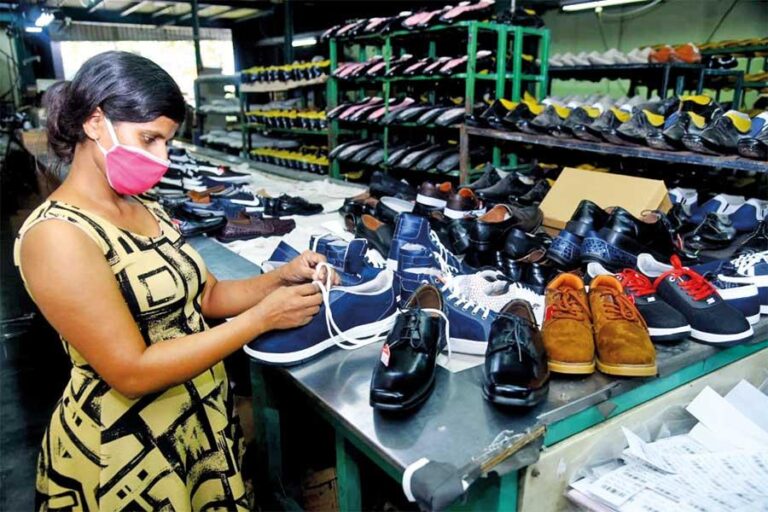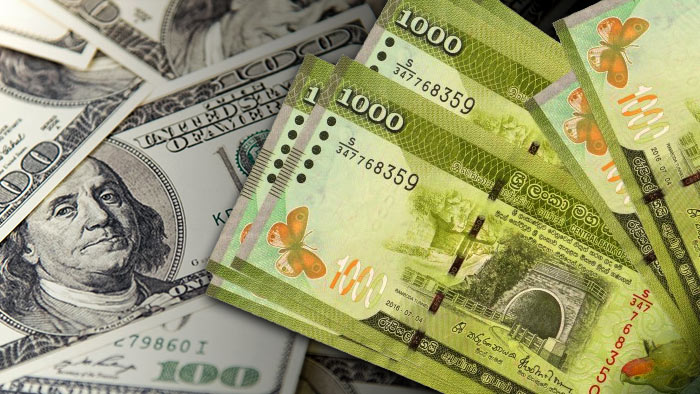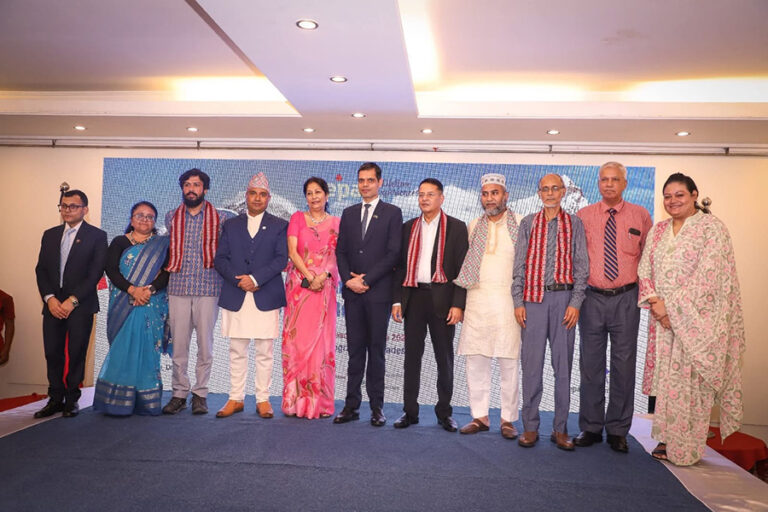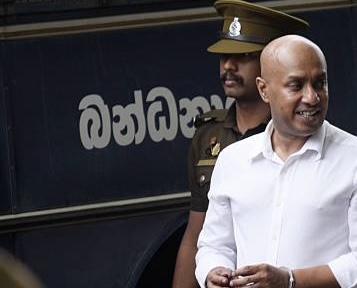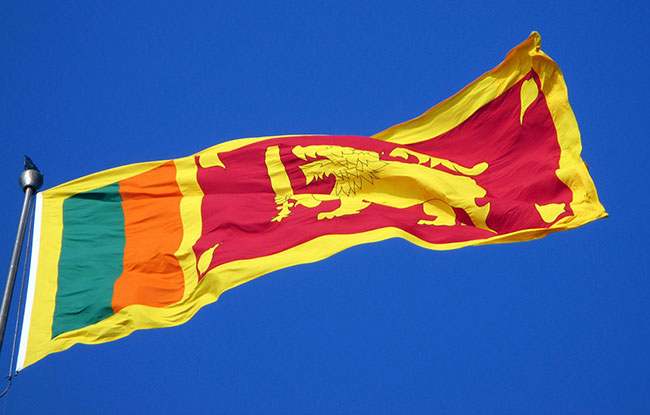By: Staff Writer
June 19, Colombo (LNW): Sri Lanka is moving forward with a long-delayed tender to build a liquefied natural gas (LNG) terminal, reviving a key energy project aimed at reducing generation costs and transitioning to cleaner fuels, Power and Energy Minister Kumara Jayakody told Parliament.
The tender, originally issued in 2021 for a Floating Storage and Regasification Unit (FSRU) under a Build-Own-Operate (BOO) model, was previously derailed by policy shifts and administrative changes. Now, the government has reactivated both the Cabinet-appointed negotiation and project committees to finalize the deal with the selected bidder. LNG supply is expected to commence in 2028.
The project is closely linked to the 300MW Sobadhanavi Combined Cycle Power Plant in Kerawalapitiya, which is designed to operate on LNG. The plant, anticipated to be completed within 18 months, will be the largest privately-owned power producer in the country. The government views LNG as a transitional energy source as it pushes toward greater reliance on renewables, despite it being more expensive than coal.
After a seven-year gap, Sri Lanka resumed cooperation with India’s Petronet LNG Limited, signing a memorandum of understanding (MoU) via state-run LTL Holdings. The partnership aims to lower energy costs, support cleaner fuel adoption, and develop a domestic LNG market, Energy Minister Kanchana Wijesekera confirmed.
Petronet had earlier partnered with Japanese firms Mitsubishi and Sojitz to build a US$250 million LNG import terminal with a capacity of around 2.7 million tonnes per annum. The plan, approved by the Public Utilities Commission of Sri Lanka (PUCSL), was to support LNG-fired power generation on a BOOT (Build-Own-Operate-Transfer) basis. The Asian Development Bank later funded expert consultancy for project development.
However, in 2022, Sri Lanka canceled its agreement with Petronet over delays, controversially awarding the tender to the Engro Consortium of China and Pakistan. This triggered diplomatic friction with India. A year later, in August 2023, the government reversed course and reinstated Petronet. As of mid-2024, the deal is nearing finalization, with Petronet likely to receive exclusive rights to supply LNG to Sri Lanka.
Energy cost comparisons presented in Parliament underscored the urgency of this shift. Hydropower, which once supported a 100% renewable grid, now costs just Rs.1.00 to Rs.12.69 per unit due to depreciation of assets. In contrast, coal costs Rs.20.80 per unit, other thermal sources range from Rs.45.52 to Rs.174.27, and diesel remains heavily taxed. Solar energy is priced between Rs.27.26 and Rs.35.50, while wind power stands at Rs.12.27.
The previously proposed New Fortress Energy deal under the Rajapaksa administration was mired in controversy. Critics, including CEB unions, opposed its ‘take-or-pay’ clause which forced long-term LNG purchases regardless of cost competitiveness. In contrast, the current BOO model allows fuel procurement at prevailing market prices, similar to how coal is sourced.
Officials note that LNG also offers future versatility beyond electricity, including powering public transport systems, as seen in other countries.
Government Revives LNG Terminal Tender for 2028 Launch
Sri Lanka Footwear Sector Eyes US $700Mn despite Labor, Smuggling Hurdles
By: Staff Writer
June 19, Colombo (LNW): Sri Lanka’s Footwear and Leather Product Industry is set to record a robust growth, driven by increasing exports, consumerism, urbanisation, and a shift towards high quality goods.
The footwear industry is to rake in US$710.97 million in revenues in 2025 and will expand, though it is being undermined by smuggling and needs investment, according to official projections.
Luxury leather goods market is anticipated to be worth $41.88 million, as the industry is known for producing an assortment of items, including footwear, handbags, and other leather goods, with the majority of producers supplying to international brands.
Collaboration between the government and industry is crucial for building a strong local supply chain and addressing issues like energy prices and currency volatility, former President of Sri Lanka Footwear and Leather Products Manufacturers Association and Chairman/ MD of P.G.Martin Industries Pvt Ltd P.G.D. Nimalasiri said
The industry needs to invest in AI and workforce up skilling to stay competitive and adapt to global trends, he said adding that man power shortage has become one of the issues facing leather product sector.
Manufacturers must be in a position to sustain worldwide quality standards and adapt to changing consumer patterns addressing the challenges of raw material prices, competition, and quality standards to sustain its growth momentum.
Among the major issues in the Sri Lankan leather production industry is a lack of unskilled laborers.
Although the government and almost everyone complain that there is high national unemployment, it is very difficult to find unskilled workers, he pointed out noting that their demand is not being met by adequate supply.
“Instead of employing more people we have adopted an effective policy whereby we give our employees additional work, which they can do at home, and thereby enhance their remuneration” he said.
The company is continuing a humanitarian mission setting a notable precedent since 2016 .by joining hands with the Prisons Department to bring hope, skill, and a chance for redemption to currently around 40 inmates at Welikada Prison, Colombo, he disclosed.
The aim was to help these inmates learn a craft, a skill that could serve them beyond their prison days, he said adding that they have been provided with a 6-month-long training by senior craftsmen and technicians of the company for them to learn the art of manufacturing.
He said “They will become skilled craftsmen, each capable of creating products from start to finish. But: they weren’t just gaining knowledge; they were earning their way toward rehabilitation”.
After completion of their training, they will be receiving a monthly remuneration. It wasn’t charity; it was a reward for their hard work and commitment, he revealed.
Rupee Remains Steady as Bond Yields Edge Up and Markets Dip
By: _Isuru Parakrama_
June 19, Colombo (LNW): The Sri Lankan rupee happens to have maintained relative stability against the US dollar on Thursday (19), opening at 300.50/70 in the spot currency market, nearly unchanged from the previous day’s close of 300.40/60, according to currency traders.
Despite the steadiness in the exchange rate, financial markets saw upward pressure on sovereign bond yields, especially across mid- to long-term maturities, indicating shifts in investor sentiment and inflation expectations.
Government securities showed a modest rise in yields, suggesting a cautious mood among market participants. A bond maturing on 15 December 2026 was quoted at 8.15 to 8.25 per cent, marking a slight uptick from the earlier range of 8.14 to 8.20 per cent.
Meanwhile, the yield on the 15 September 2027 bond inched upward, quoted at 8.50 to 8.60 per cent.
Longer-dated securities also reflected the rising yield trend. The 15 October 2028 bond remained steady at 8.90 to 9.00 percent, whilst the 15 December 2029 bond saw a more notable climb to 9.62 to 9.67 percent, compared to the previous 9.52 to 9.56 per cent range.
The 15 March 2031 issue moved up to 10.05 to 10.20 per cent, indicating heightened risk premiums on longer maturities.
The 15 December 2032 bond closed at 10.35 to 10.40 per cent, modestly up from Wednesday’s 10.31 to 10.38 per cent quotes.
Analysts attribute the rise in yields to ongoing fiscal and monetary adjustments, as well as broader concerns about global interest rate trends and domestic refinancing challenges.
In equities, the Colombo Stock Exchange (CSE) saw a downward trend, reflecting subdued investor confidence and cautious positioning. Whilst the rupee’s firmness suggests a measure of external sector stability—likely supported by remittance flows, tourism revenue, and improved trade balances—the simultaneous rise in bond yields underscores underlying apprehensions about inflationary pressures and debt sustainability.
Insiders told LNW that market observers are also keeping a close watch on the Central Bank’s monetary policy signals and potential fiscal developments that could influence investor appetite for rupee-denominated assets.
Amid these dynamics, financial stakeholders are navigating a complex terrain shaped by both domestic reform efforts and global financial volatility.
Fashion Bug Among Sri Lanka’s Most Loved Corporate Brands Recognised by LMD
June 19, Colombo (LNW): Fashion Bug has been recognised as one of Sri Lanka’s Top 50 Most Loved Corporate Brands and has also been named among the Most Loved Clothing Store Brands in LMD’s Brands Annual 2025.
The recognitions are based on a survey conducted by PepperCube Consultants on behalf of LMD. The study aimed to identify the brands that resonate most with LMD’s readers, utilising detailed research and data analysis.
The survey featured a balanced demographic, with 52% female and 48% male respondents. Participants were drawn from key regions, including the Western, Southern, Central, North-Western, and Northern Provinces.
Expressing his gratitude, Fashion Bug’s Director, Mr Shabier Subian, remarked, “We are grateful to be acknowledged among Sri Lanka’s Top 50 Most Loved Corporate Brands and as one of the Most Loved Clothing Store Brands in LMD’s Brands Annual 2025. These achievements reflect the trust of our customers, the support of our partners, and the dedication of our team.”
The brand was also recognised in the LMD Customer Excellence Survey 2024 as the leader in two key categories: ‘Clothing & Accessories’ and ‘Online Stores (Clothing)’ for the second consecutive year.
Founded in 1994 with a team of seven, Fashion Bug has evolved into a prominent name in Sri Lanka’s retail industry, operating 14 outlets nationwide and employing over a thousand individuals. Today, the brand proudly showcases locally designed and crafted collections while seamlessly incorporating global trends to align with its customers’ preferences.
Image Caption:
Mr Shabier Subian, Director of Fashion Bug
Govt Launches Revival Drive for Crisis-Hit SMEs providing Rs. 1 Trillion Aid
By: Staff Writer
June 19, Colombo (LNW): The Sri Lankan government is intensifying efforts to revive and support Small and Medium Enterprises (SMEs) with a sweeping financial package exceeding Rs. 1 trillion and a raft of institutional reforms aimed at boosting long-term sustainability, the Ministry of Finance announced.
In 2024 alone, over Rs. 1 trillion has been distributed to SMEs through 16 public and private banks, resulting in the issuance of 163,279 loans. Finance Ministry data show that approximately 51% of this funding has been directed towards industrial enterprises, with 13% allocated to agriculture and service sectors.
Recognising the critical role SMEs play in the economy—contributing 52% to GDP and employing over 4.5 million people—the government has rolled out multiple financial and technical initiatives. Among them is the establishment of a Rs. 5 billion fund to support SMEs facing short-term investment and working capital challenges.
The Central Bank has advised licensed commercial and specialised banks to offer extended concessions, including interest relief and new lending lines, to SMEs affected by recent economic crises. Notably, the deadline for banks to finalize rescheduling agreements under Circular No. 04 of 2024 has been extended from June 15 to June 30, 2025, giving businesses additional time to stabilize.
To further strengthen SME resilience, the government is creating a new Development Bank aimed at providing accessible, possibly collateral-free financing, especially for startups and underserved entrepreneurs. At the same time, the Ministry of Industry is enhancing access to low-cost credit through the Industrial Development Board (IDB).
On the technical front, a series of Business Development Services (BDS) will be introduced, including district-level Technical Service Centres to guide SMEs in technology, innovation, and management. A Technology Development Fund is being set up to encourage research and development, complemented by new Voucher Schemes that will subsidize SME access to BDS and R&D.
The Ministry of Industry and Entrepreneurship Development has already formed an Advisory Committee to support businesses still reeling from the COVID-19 pandemic and the economic crisis. Plans are also underway to establish a dedicated SME Authority to consolidate oversight and fast-track development processes.
Sri Lanka had over 1.3 million Micro, Small, and Medium Enterprises (MSMEs) in 2022. However, nearly 16% had closed permanently, and around 4.5% were temporarily shut due to economic hardship. The government’s renewed focus includes tapping into emerging sectors like green technology, ICT, and Agri-tech to ensure SMEs not only recover but thrive in a more resilient economic ecosystem
Sri Lanka Seeks Bangladeshi Investment to Boost Pharma Sector.
By: Staff Writer
June 19, Colombo (LNW): Sri Lanka has extended a strong invitation to Bangladeshi entrepreneurs to invest in its pharmaceutical sector and collaborate in key export-oriented industries, signaling a renewed push to deepen economic ties between the two South Asian nations.
The appeal was made during a high-profile business plenary session titled “Sri Lanka & Bangladesh Economic Ties: Building Bridges for Growth”, held on June 18 at the National Chamber of Commerce of Sri Lanka in Colombo. The event brought together over 70 Sri Lankan companies and a business delegation from the Dhaka Chamber of Commerce and Industry (DCCI), resulting in more than 150 bilateral business meetings.
With Sri Lanka actively seeking to reduce its reliance on imported medicines and boost domestic manufacturing capacity, officials said the time was ripe for Bangladesh — which has developed a competitive and growing pharmaceutical industry — to play a more prominent role in meeting Sri Lanka’s needs.
President of the National Chamber, Anura Warnakulasooriya, emphasized the importance of fostering mutual trust and greater private sector engagement, saying that both countries stood to benefit from partnerships in value-added sectors.
Andre Fernando, President of the Sri Lanka-Bangladesh Business Cooperation Council, specifically urged Bangladeshi investors to explore opportunities in Sri Lanka’s pharmaceutical industry, where the government is encouraging foreign direct investment and offering facilitation through dedicated export processing zones.
Reinforcing this message, Renuka M Weerakone, Director General of the Board of Investment (BOI), highlighted that Sri Lanka has established 15 export processing zones — several of which are geared toward pharmaceuticals, medical devices, and fabric-based industries — offering investment incentives and infrastructure support.
DCCI President Taskeen Ahmed said Bangladesh’s pharmaceutical, garments, leather, and ICT sectors were globally competitive, and he welcomed Sri Lankan businesses to invest in Bangladesh’s own economic zones, which offer tax breaks, modern logistics, and skilled labor.
Bangladesh is already a key supplier of pharmaceuticals and ready-made garments to Sri Lanka, but both sides agreed the potential remains largely untapped. Export Development Board Chairman Mangala Wijesinghe called for expanded cooperation in packaging, logistics, and agriculture, in addition to pharmaceuticals.
Both the Bangladeshi High Commissioner to Sri Lanka Andaleeb Elias and Sri Lankan High Commissioner to Bangladesh Dharmapala Weerakkody endorsed a Free Trade Agreement (FTA) to dismantle tariff barriers and facilitate smoother trade flows.
Former DCCI President Rizwan Rahman stressed the importance of maritime connectivity and regulatory reforms to unlock further trade potential, noting that improved shipping and lower trade costs would benefit both economies.
Govt on Standby to Rescue Sri Lankans in Israel
By: Puli
June 19, Colombo (LNW): The Sri Lankan government is fully prepared to evacuate its citizens from Israel if the situation worsens due to the ongoing conflict, Foreign Minister Vijitha Herath told Parliament today.
Responding to a question raised by SJB MP Rohana Bandara, the Minister said arrangements are in place to bring Sri Lankan expatriate workers home should an emergency arise.
“We will bring them to bordering countries by land and will send flights to bring them back home,” he said.
The government continues to monitor the situation closely and is ready to act swiftly if evacuation becomes necessary.
Duminda Dissanayake in Court Over Gold-Plated firearm Case
By: Puli
June 19, Colombo (LNW): Former Agriculture Minister and SLFP Anuradhapura organiser Duminda Dissanayake, who is currently in remand custody, was presented before the Mount Lavinia Magistrate’s Court today (19).
He was arrested following the discovery of a gold-plated firearm at the Havelock City housing complex. Dissanayake remains in custody as investigations into the incident continue.
At a previous hearing on June 5, the court extended his remand until June 19, pending further inquiries into the origin and ownership of the weapon.
Showers and Thundershowers Expected in Several Areas with Strong Winds in Parts of Sri Lanka – Public Urged to Take Precautions
June 19, Colombo (LNW): Several spells of showers will occur in the Western, Sabaragamuwa and North-western provinces and in Nuwara-Eliya, Kandy, Galle and Matara districts.
Showers or thundershowers may occur at a few places in the Uva province and in Ampara and Batticaloa districts in during the afternoon or night.
Fairly strong winds of about (30-40) kmph can be expected at times over Western slopes of the central hills and in Northern, North-central, Southern and North-western provinces and in Trincomalee district.
The general public is kindly requested to take adequate precautions to minimize damages caused by temporary localized strong winds and lightning during thundershowers.
(Department of Meteorology)
Treasury Reform Puts Emission Trust Fund at Risk
Sri Lanka’s Vehicular Emission Test Trust Fund (VETTF), a key initiative in curbing vehicle-related pollution, faces an uncertain future following sweeping fiscal reforms introduced under the Public Financial Management Act No. 44 of 2024.
The new legislation mandates the dissolution of all independently managed public funds and their integration into the central Treasury. As a result, the VETTF—established in 2008 to support vehicle emission regulation—is now required to transfer its financial assets to the Treasury by August 25, raising concerns over the continuity and autonomy of critical environmental efforts.
According to a senior Treasury official, the change is not aimed at abolishing the fund but is a “statutory requirement” to ensure greater transparency and centralized fiscal oversight. “Departments can no longer manage independent funds. Everything must now go through the Treasury,” he explained.
The Motor Traffic Department (MTD), which oversees the fund, confirmed the directive was communicated through an official circular. A senior MTD source, speaking on condition of anonymity, acknowledged the fund was deemed non-statutory under the new regulations, necessitating its dissolution.
The VETTF is financed through a 10 percent levy on vehicle emission tests, with the remaining 90 percent allocated to private testing companies. Though official figures are not disclosed, revenue from the program is estimated at Rs. 1.5–2 billion annually, based on test volumes and vehicle registrations.
Since its inception, the fund has supported a wide range of initiatives including random on-road emission checks, public education campaigns, training of emission testing technicians, and research into improving air quality. One of its notable projects in 2023 was the “WhatsApp Spotter” program, which empowered citizens to report vehicles emitting excessive smoke in real time.
Environmentalists and transport sector professionals are voicing concern that centralizing the fund’s management could reduce the efficiency and independence of these operations. They argue that the fund’s unique structure—governed by a five-member board and protected under a trust deed—has enabled targeted, responsive decision-making without reliance on Treasury funding.
The origins of the VETTF lie in public advocacy dating back to 1998 and a landmark Supreme Court ruling in 2000, which led to its creation as a mechanism to independently support vehicle emission regulation.
While the Treasury has assured continuity of operations under centralized management, critics warn that losing the fund’s autonomy could dilute its impact, undermine transparency, and stall progress in reducing vehicular emissions in Sri Lanka.


